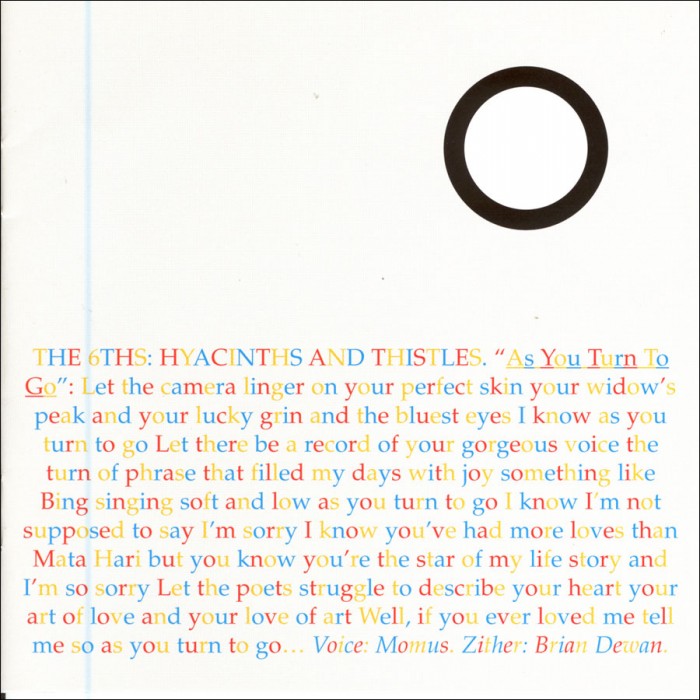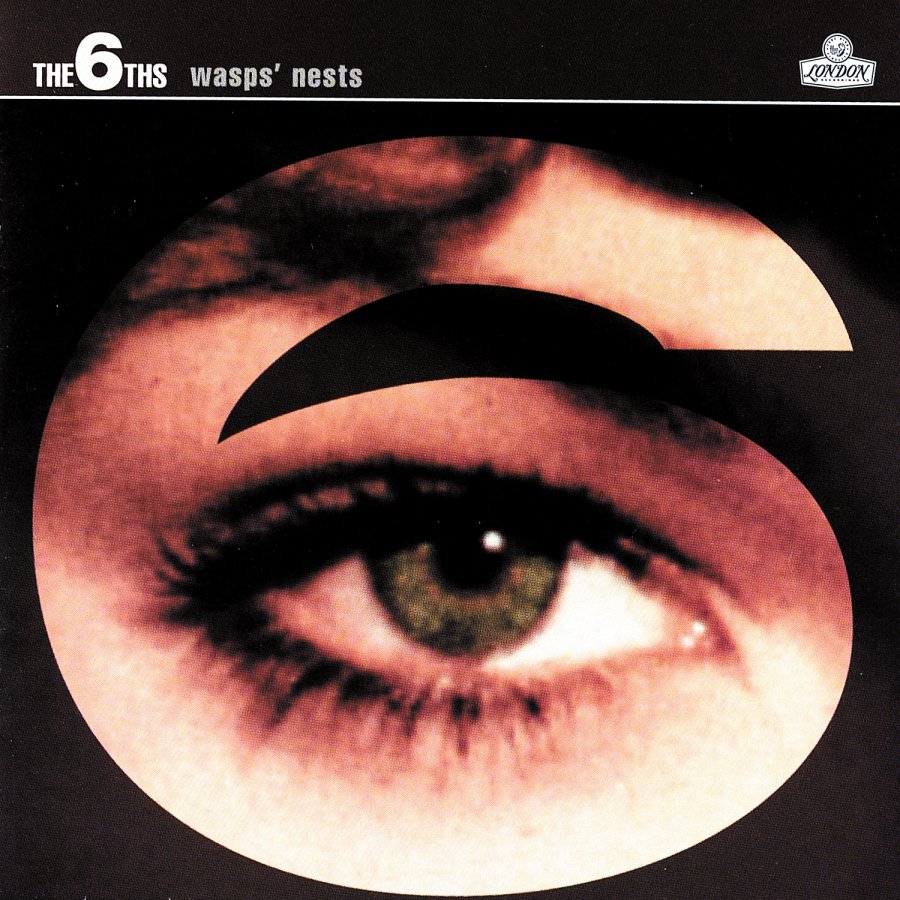The 6ths
The 6ths—the band for which Stephin Merritt writes music and lyrics and then enlists famous singers to record the songs—have released two albums, “Wasps’ Nests” (1995) and “Hyacinths and Thistles” (2000). Folk heroines Odetta and Melanie and 80’s synth heroes Marc Almond and Gary Numan are but a few of the many voices that appear on the records.
The following is a piece written by Magnetic Fields’ accordionist Daniel Handler, upon the release of the 6ths’ second album, “Hyacinths and Thistles:”
DANIEL HANDLER WRITES:
The 6ths, every lisper's nightmare, are back with their long-awaited sophomore effort. Not that Stephin Merritt has been the most idle of songwriters lately. Gloom aficiandos have been happy with the debut of The Gothic Archies—the band in which Mr. Merritt writes the songs and performs all the instruments and vocals. Electropoppers have been grooving off the latest release by Future Bible Heroes— the band in which Mr. Merritt co-writes the songs and performs half the vocals. And, oh yeah, there's The Magnetic Fields, the band in which Mr. Merritt writes the songs and performed just about every note of 69 Love Songs, the three-disc magnum opus that ended up on every critic's poll and threatened to transform him from our favorite well-kept secret to our newest household word.
But somewhere in this maelstrom of songwriting, Mr. Merritt still found time to make what some consider to be his best album. The 6ths—the band in which Mr. Merritt writes the songs and lets other people sing 'em—return with Hyacinths And Thistles, another tongue-twister of a title. Whereas the first album,Wasps Nests, proclaimed Mr. Merritt's flirtation with indie pop, with contributions from the likes of Superchunk, Sebadoh and Yo La Tengo, Hyacinths And Thistles is something else. Inspired by the "chanson" tradition—think Serge Gainsbourg and Jacques Brel, sitting at a piano, smoking Gauloises and weeping into their cognac—the new album calls to mind a dimly lit if astonishingly well-equipped musical café. A hodgepodge of vocalists—ranging from electro-pioneers to folk heroes—stop in to to share a kir royale with Mr. Merritt and learn the tune he's just finished writing on the dusty Moog in the corner. The arrangements are intimate, sometimes just one instrumentalist behind the singer.
The songs are less Brill Building perfectionist pop, more off-center, off-Broadway: showy, emotional, with the occasional loose thread hanging and odd seam showing. This is one of those albums where your favorite song will change every week, until the whole thing has grown on you and you know by heart every gentle razor of a lyric.
Written and recorded before 69 Love Songs, the album shows the beginnings of the utter diversity of the three-disc set, the wilder evolutions from his comparatively similar early work. The collection of singers who agreed to participate in this round of 6ths reveal the breadth of Mr. Merritt's growing reputation and the widening spectrum of his musical interests. Often written expressly for the vocalists, the new 6ths songs allow the performers' individual personalities to mix familiar elements into brand new cocktails: sweet, bitter, bubbly, served up, in pretty glasses.
And what new concoctions they are: British songwriter Momus leaves behind the conceptualist wordplay of his own records for the stark vulnerability of "As You Turn To Go," accompanied solely by zitherist Brian Dewan. Sally Timms forsakes the warped cowpunk of the Mekons to whisper the late-night technopop of "Give Me Back My Dreams," one of the loneliest songs Mr. Merritt has composed: "You don't have to talk to me/The way we used to talk for hours/we don't have to talk at all/but may I send you flowers?" Bob Mould removes the laurel of Punk Godfather from his work in Husker Du and Sugar and becomes an outright romantic crooner for the piano ballad "He Didn't." Woodstock anti-hipster Melanie performs the bitter sigh "I've Got New York," accompanied only by Margaret Leng-Tan, the classically-trained queen of the toy piano. Sarah Cracknell, who with St. Etienne has stretched the boundaries of what a pop song can be, returns to the classics in "Kissing Things," Mr. Merritt's line-by-line dissection of Gershwin's "Our Love Is Here to Stay." Neil Hannon retreats from the melodrama of The Divine Comedy to rattle off a couple of droll, anti-clerical verses on "The Dead Only Quickly." Gary Numan, the robotic titan of early electropop, trades in his deadpan for the desperate ache of "The Sailor In Love With The Sea"—in which "paler" rhymes with "Elizabeth Taylor"—and Katherine Whalen takes a breather from the breakneck pep of the Squirrel Nut Zippers to make good on her Lady Day comparisons in "You You You You You."
And the rest are perfect nightcaps. Magnetic Fields fans will be delighted to find here long-awaited recorded versions of two live staples: "Just Like A Movie Star," given lush French vocals by Dominique A, and "Lindy-Lou,"in a surprisingly understated performance by Miho Hatori of Cibo Matto. "Volcana!", sung by Soft Cell's Mark Almond, shows Mr. Merritt's burgeoning interest in exotica—those tropical sound effects, by the way, are the real thing, shipped over from a Honolulu sound bank—and a few islands up is Liz Cox of Combustible Edison with "Oahu," with an extended fadeout that's the closest thing to "jamming" we're liable to get from such a perfectionist. Altered Images vocalist and Gregory's Girl star Clare Grogan sings "Night Falls Like A Grand Piano," a virtual minihistory of Mr. Merritt's songwriting: It begins with some esoteric imagery, but ends with a stark "I love you," from a songwriter whose early poetics have evolved into the more straightforward romanticism of his current work.
Shortly after we met, Mr. Merritt asked me to play accordion behind Odetta on "Waltzing Me All The Way Home." I was nervous: an amateur musician, showing up at a real live recording studio to play behind a singer whose glorious voice has made her a folksuperheroine since the 1960s. Odetta's grand entrance didn't calm me down any—she recited a long, invented history about the hero of the song and made me promise to keep the tale in mind as we did the first take. But then she began to sing, and I thought, whatever you need to do, whatever story you need to tell to sound like this, go right ahead.
For Mr. Merritt, it's the same thing: whatever styles he needs to inhabit or invent, whatever singers he needs to invite or instrumentalists he needs to seek out, whatever he needs to sound like this, he should go right ahead.
And so should you. Whether you've been waiting breathlessly for Mr. Merritt's latest concoction, whether you've been curious to hear what all the critical fuss has been about, or whether you've been hiding in a cave for the past year and never heard of this guy, Hyacinths And Thistles is something you should make room for on your shelf, even though it won't leave your stereo for quite some time. You're the finder, and it's a keeper.


